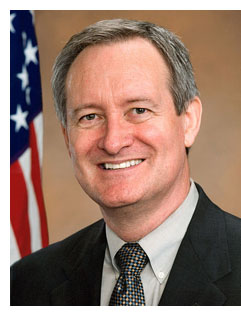
Addressing highway infrastructure needs
By U.S. Senator Mike Crapo
We rely on our highways to get goods to markets both at home and abroad. We rely on them to get to work and school. We rely on them for recreation and tourism. We rely on them to help grow our economy. In a nation and state as expansive as ours, we cannot afford to be lax in the upkeep of our transportation infrastructure. That is why it is important that Congress periodically review federal transportation infrastructure policy and make any necessary changes to ensure it is meeting America's needs while not overspending.
The Senate Environment and Public Works (EPW) Committee, on which I serve, recently approved a highway reauthorization bill that expands on the transportation reforms enacted in the Moving Ahead for Progress in the 21st Century (MAP-21) law. The bipartisan legislation would extend highway programs for the next six years if funding is not exceeded, expand state and local flexibility in cost-effectively carrying out projects and increase transparency in the use of taxpayer dollars on infrastructure projects.
bill that expands on the transportation reforms enacted in the Moving Ahead for Progress in the 21st Century (MAP-21) law. The bipartisan legislation would extend highway programs for the next six years if funding is not exceeded, expand state and local flexibility in cost-effectively carrying out projects and increase transparency in the use of taxpayer dollars on infrastructure projects.
Importantly for Idaho, the bill maintains funding percentages that are fair to rural areas. As a member of the EPW Committee, I have advocated for maintaining a highway funding formula that does not discriminate against states like Idaho that have long rural stretches of road that connect the country and fewer people to support these roads.
Additionally, the legislation reinforces provisions I have long pressed for to expedite project completion goals while protecting environmental concerns. While Congress needs to enact additional reforms to streamline the environmental compliance process for critical transportation projects across the country, the bill builds on some of the structural changes in MAP-21 to ensure project delivery is not overly burdened by regulatory obstacles.
The legislation also would retain the Recreational Trails Program, which I worked with my colleagues to include, that enhances outdoor opportunities by helping states develop and maintain recreational trails for uses such as hiking, running, bicycling, equestrian use, snowmobiling, four-wheel driving, all-terrain riding and other off-road vehicle use.
The EPW Committee's advancement of this legislation is a positive step, and it represents a win for rural states like Idaho. However, more work is needed to address the estimated $94 billion funding shortfall the legislation faces. Revenue from fuel taxes has diminished as a result of increasing efficiencies and is no longer projected to cover our growing transportation needs. I serve on the Senate Finance Committee, which is tasked with addressing the funding shortfall, and the Senate Banking, Housing and Urban Affairs Committee that is expected to contribute a transit title to the bill.
While the stability in getting a longer term reauthorization done is important, it is also essential that Congress live within its means. That is why I supported an amendment offered by Senator Jeff Sessions (R-Alabama) that would require federal highway program spending to match revenue receipts into the Highway Trust Fund if a longer term funding solution cannot be identified. This will ensure that the legislation does not extend these programs beyond the ability to pay for them.
As Congress continues its work on addressing our nation's transportation infrastructure needs, I will continue to advocate for enacting a fiscally responsible transportation reauthorization bill, which is one of the best jobs bills that Congress could consider. In this time of massive deficits, funding for critical infrastructure needs should be based on a sound fiscal plan and no longer rely on borrowing funds to prop up shortfalls.
Published 6-27-14